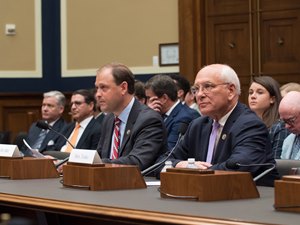Tonko Expects Fall Hearing on Horseracing Integrity Act


Rep. Paul Tonko, a New York Democrat, said Aug. 1 that he expects a subcommittee hearing on the Horseracing Integrity Act of 2019 this fall.
Against the backdrop of Saratoga Race Course, Tonko gathered a small group of industry stakeholders to call for action on the bill, HR-1754. Along with Rep. Andy Barr, a Kentucky Republican, Tonko is co-sponsor of the legislation that would move oversight of the sport's equine drug testing and medication policies from state regulators to a newly formed Horseracing Anti-Doping and Medication Control Authority, which would be a single, private, independent group to oversee these issues for all United States racing.
Tonko—standing with Arthur Hancock of Stone Farm; Hancock's wife Staci, a co-founder of the Water Hay Oats Alliance; trainer Nick Zito and his wife, Kim; and NYRA director of communications Pat McKenna—said, "There is no better place from which to launch (this legislation) than here at Saratoga Race Course."
In outlining the process for moving the bill through to a House vote, Tonko said it will be assigned to a subcommittee of the House Energy and Commerce Committee, which he expects will host a hearing this fall. Following markup of the bill, the legislation would eventually proceed to a full vote on the House floor.
"I hope that a full vote will happen in a matter of months," he said of the bill he reintroduced in March, a version similar to previous bills he introduced. Through July 31, the current bill had 137 sponsors in the House.
Tonko also called on Senate Majority Leader Mitch McConnell, a Kentucky Republican, to move forward with a Senate version of the bill.
The bill would see the United States Anti-Doping Agency oversee the Horse Racing Anti-Doping Medication Control Authority, which would include industry stakeholders, to oversee drug testing and make medication rules for the sport. The legislation also calls for ending race-day medication, which would end the wide reliance on Lasix in U.S. racing.
Calling the bill stakeholder-driven, Tonko said it is about "the welfare of the equine athlete, and about protecting our jockeys."
The bill is supported by The Jockey Club and the Coalition for Horse Racing Integrity, a diverse group of 18 members that includes racing organizations, racetracks, owner and breeder associations, and animal welfare groups that support adoption of a national uniform standard for drug and medication rules in horse racing.
The country's two largest horsemen's groups, the National Horsemen's Benevolent and Protective Association and the Thoroughbred Horsemen's Association, have opposed the legislation as they favor the continued use of race-day Lasix, among other concerns.
A new wrinkle to the debate this year is the fact major tracks have announced plans to restrict the use of Lasix. After the deaths of 30 horses in racing or training at the Santa Anita Park meeting Dec. 26-June 23, The Stronach Group, New York Racing Association, Churchill Downs Inc. and others announced new medication policies that include phasing out race-day Lasix.
"We support International Federation of Horseracing Authorities rules," said Staci Hancock, referencing international standards that prohibit race-day Lasix. "We want to compete on the same level playing field as the rest of the world, and none of them allow race-day medication. We're an outcast."
Tonko resisted the assertion that eliminating race-day medication is a non-negotiable element of the bill.
"We have indicated that it is banned in the framework of our legislation," he said. "But then we leave the balance of addressing all medication to this panel. This is about establishing a panel of self-governance within (USADA) and industry stakeholders. It will be their task to do the best for the sport and for the equine athlete."
Zito acknowledged exercise-induced pulmonary hemorrhage is a problem for horses, but he said the current approach isn't working for the overall good of the sport.
"Something has to be done because if it's not, it's the same thing," Zito said. "The game is bigger than everyone, and the game is in dire straits right now."
Arthur Hancock outlined his reasons for supporting a ban on race-day Lasix.
"Public perception, it's better for the breeder, and better for the health of the horses," Hancock said.
He also said he was comfortable with horses training on Lasix.
"That's what they do in England, that's what they do in a lot of places," he said. "Just not 24 hours before a race. Then you don't have the chemical horse running, you have the horse running on his own ability."
NYRA sees the bill as a chance to bring uniformity to equine medication rules and testing. Noting the economic impact of horse racing in New York state, McKenna said NYRA applauds the development of uniform rules and regulations.
"This is a critical time for all industry partners to collaborate," he said. "Uniformity is good for the longevity of the sport."
